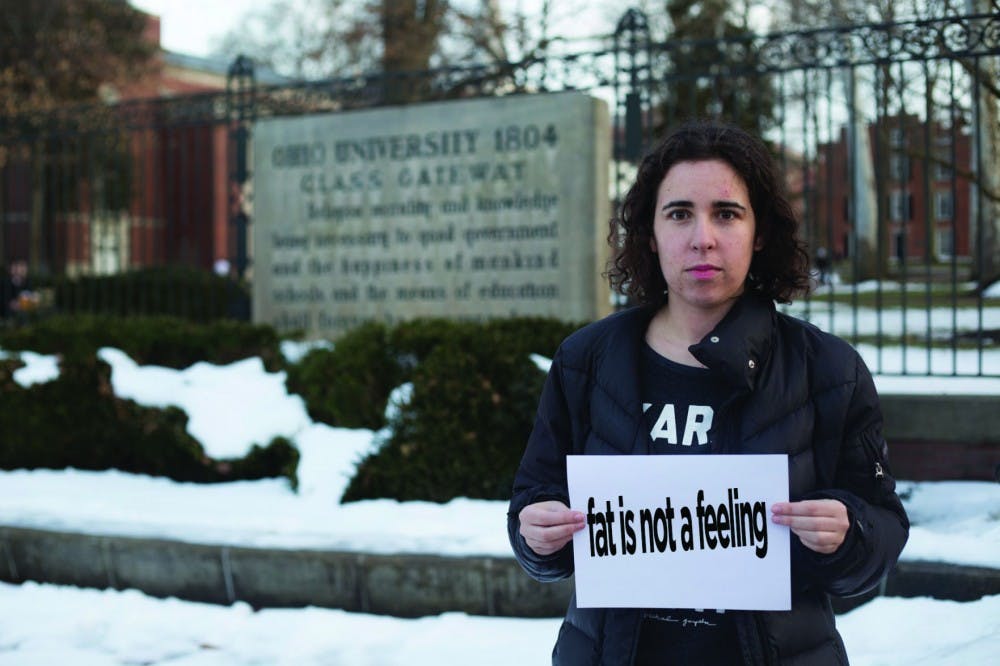First-year graduate playwright Catherine Weingarten has partnered with Endangered Bodies to petition Facebook to remove its “feeling fat” emoji.
A petition demanding Facebook removes its “feeling fat” emoji option is striking up conversation worldwide, and it all started with a Bobcat.
Catherine Weingarten is a first year playwright and one activist sought by Endangered Bodies to spearhead its petition. Endangered Bodies is a local-global initiative that “challenges the current toxic culture that promotes negative body image.” The petition had about 16,000 signatures as of press time.
Weingarten is the only activist in the group from the U.S. Other activists are from seven other countries, including Germany and Argentina. The petition launched during this year’s National Eating Disorders Awareness week that ran from Feb. 22 to Feb. 28.
The Post talked with Weingarten about her efforts to get the emoji removed.
{{tncms-asset app="editorial" id="5e54279e-a105-11e4-bc8b-eb612fb8fe69"}}
The Post: Why do you think it has gained so much attention?
CW: I feel like people are starting to become aware of the way they treat women in the media and just the fact that we put so much pressure on women to lose weight and be prettier and all these things. … I think that we can change the way we talk about our bodies.
P: What is the role social media plays in the conversation about body positivity?
CW: (Social media) is the way we live and the way we talk to people. … Because (our generation is) on social media so much we need to be aware of the impact social media has on us and how it can make you feel bad about your body.
P: Do you think people are aware of the impact of emojis?
CW: I don’t think so. … The normal way to talk about our bodies is to talk about dieting and how you’re not good enough. That’s the cool thing about this petition is it’s taking something that is normalized in our culture and saying, “Hey, this is weird. Why do we do this?”
P: Have you talked to anyone from Facebook?
CW: I haven’t directly talked to anyone at Facebook. I know Endangered Bodies has been talking to them. I feel hopeful about it. … The fact that it’s big organizations — I don’t stand by myself.
P: How have people from Ohio University reacted?
CW: I don’t think anyone knows about it at OU. (Laughs)
P: Why is this petition important to you?
CW: Coming from an experience of struggling with the way I look, I was in a really negative place and the only words I heard in my mind were, “I feel fat.” … I just really hope this petition starts a conversation about people, especially young women, trying to find more positive ways to talk about your body and respect your body.
P: What do you feel is the impact of having “fat” as an emotion?
CW: (Fat is) not actually a feeling and everyone has fat on their bodies. A lot of times in our culture when we think of “fat,” it has a really negative connotation. So sometimes girls would say “I’m feeling fat,” but they’re not really feeling fat. They’re feeling unpopular or bad about themselves. It’s one of those words that has a lot of stigma and negativity associated with it.
P: I know you often write female-centric and female empowerment-oriented plays, so how does feminism play a role in your life and this petition?
CW: For me, activism and playwriting are very connected because I feel like activism is about telling truths and telling things people don’t want to hear but feel really real and that’s what I try to do in my playwriting work too. So I write about young women who feel really bad about themselves and feel all this pressure and that’s what I’m trying to combat in the media.
@buzzlightmeryl
mg986611@ohio.edu






